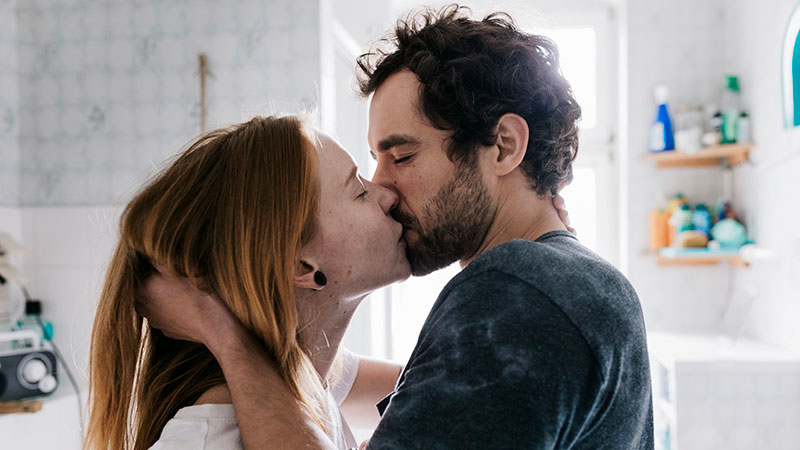1 in 3 singles never use contraception during sex (and yes it’s time to panic)

Pic via Getty Images.
We’re calling it – Australia is in a contraception crisis. New data from the Body+Soul 2024 Sex Census shows only a tiny number of Aussies are wrapping it up before getting it on.
Words by Ebony Leigh at bodyandsoul.com.au
It looks like the days of ‘no glove, no love’ are officially over with the Body+Soul 2024 Sex Census confirming that Australian singles have picked up some pretty poor practices.
After grilling more than 2000 people on their bedroom behaviours and relationship routines, we learnt that safe sex is important to a lot of them. But we’re clearly a nation of ‘all talk, no action’, because while 68 per cent of survey respondents agree that yes, safe safe should be practised on every occasion, one in four (26 per cent) Aussies never use contraception.
Then we asked to see the stats on the singles. We get it, maybe the love birds aren’t worried about a potential pregnancy or catching an STI while in a monogamous relationship (but if you’re not, here’s why you should be).
But holy moly, when we got the results back we were shook.
According to our sex stats, contraception isn’t even on the agenda for 20 per cent of singles and 19 per cent of those dating or in situationships – who say they never ever use protection. A further 11 and 14 per cent, respectively, are on the fence, saying they “hardly ever” use protection.
In fact, just 18 per cent of singles and 15 per cent of those playing the field use contraception every time they have sex.
So yes, is time to panic. But the culprit, we believe, is the common condom.
Why aren’t Aussies covering up?
While contraception use in Australia is alarmingly low, when Aussies do decide to have sex safe, their pick of protection is a condom, with 72 per cent of singles and 66 per cent of daters voting in favour of the reliable rubbers.
But as we know from the stats, there are plenty of people out there who aren’t suiting up when they sleep with someone new.
So why aren’t Aussies using this readily available form of protection? We went straight to sexologist Lucy Macdonald to ask why this is, considering you can literally “buy them everywhere” and they’re the best form of protection against STIs.
7 reasons Aussies aren’t using condoms (and 7 reasons you should be)
#1. ‘They decrease sensitivity’
We’re sure you’ve heard this before, but that doesn’t mean it’s a valid POV.
“Sometimes people comment on the feeling of wearing condoms,” Macdonald explains to Body+Soul. “And people get anxious that they might lose their erection when they’ve got one on. Or if they’re not achieving the same levels of pleasure or an orgasm or something that they want to, and they’re getting stressed that it’s going on for too long, then they might take it off.”
Macdonald warns “there are so many difference excuses” penis owners may make for not wearing protection with a partner. “Like, ‘Oh I’m too big for it’ – which is my favorite one – or ‘It’s not going to feel good’ or ‘It’s uncomfortable for me’.
The long and the short of it is, “if your partner is asking you to use one and I think you can put aside it being a little bit less sensitive so you can both relax and have a good time without worrying about that.”
What’s better than sex without worry?
#2. ‘They dry up’
“Condoms are lubricated but after using a condom for a really long time, they can start getting uncomfortable, and instead of considering, ‘Oh maybe we should stop for a minute or use some lube’, people will just chuck it off,” the sexologist explains.
An easy solution – lube is always your best mate in the bedroom. There are so many different types to choose from, and adding your favourite to playtime can not only boost sensation, but will keep things moving in a safe and sensuous way.
Doctors also recommend changing your condom during long sessions – read up on their recommendations here.

#3. They’re not on our screens
While millennials had condoms shoved down their throats, in pop-culture and sex ed, condoms have largely slipped out of the conversation for younger gens.
“I just feel like I never, ever see them in media,” says Macdonald. “Even in movies, you never see someone on an awkward moment of, ‘Oh, do you have a condom?’. It’s just not seen. So people don’t really think of it as a really important step during sex because it’s just not there.”
News flash, movie cameo or otherwise, condoms are a necessary and common part of sexual conversation. And what’s sexier than having sex that’s safe?
#4. They’re not in our sexual scripts
“People’s ideas of sex and their sexual scripts don’t include condoms, and they just don’t think of them as a really big deal,” the sexpert explains. “And I feel like people don’t consider them until they do get an STI or something happens, and then they change the way they’re thinking. But prior to that, they’re thinking, ‘Oh, that won’t happen to me, so no problem’.”
The solution? Change the script before something goes wrong.
#5. They’re the butt of the joke
Where you can find mention of condoms, however, is in a punchline.
“I just feel like there is such a societal joke around condoms and it’s funny that at a young age kids carry them around in their wallet as like a form of pride, but then in adulthood, you can’t find a single person carrying one around, and it’s like, what’s going on?” Macdonald says.
“In a lot of education settings, a condom gets whipped out at the very end of a sex ed lesson and you put it on a banana and it’s all a big joke,” comments the sexologist.
“But I truly believe that practising putting them on in sex ed classes is actually really, really beneficial.”

#7. We forget our education
It seems that the older we get and the more years that pass since our scant sex education, the more likely people are to skip contraception altogether.
While 23 per cent of Gen Z use protection every single time they get it on, that number drops to 21 per cent for millennials, 15 per cent for Gen X and five per cent for Boomers and the Silent Generation.
When we look at those who never practice safe sex, 15 per cent of Gen Z don’t use contraception compared to 19 per cent of Millennials, 31 per cent of Gen X and 34 per cent of Boomers and the Silent Generation.
“I feel like young people are often a little bit more clued in while there’s a massive pool of older people who were not serviced by education systems,” Macdonald explains.”There are multiple generations of people who are just rolling around having no understanding of safe sex and don’t think about it until they’re directly harmed or something’s happened.”
That being said, a new report from the World Health Organisation (WHO) Regional Office for Europe shows “condom use among sexually active adolescents has declined significantly since 2014, with rates of unprotected sex worryingly high.”
The Sex Census data also shows that people who are dating have almost triple the risk of catching an STI compared to those in relationships, which could also point to those in younger age-groups who are more likely to be going on dates.
Thus, this is clearly a problem we need to address at all ages.
How to get more people using condoms
While education will be the biggest asset on a nationwide level, it’s crucial to integrate conversations around condoms on a grassroots level too.
Call out friends, talk about normalising condom use and stop making jokes about unsafe sex, are Macdonald’s tips. While she says the media has the biggest role to play because that’s where we consume everything.
“The media has a lot to say in terms of a number of different things related to sex, and if they’re not showing any kind of condom use in movies and TV shows or stopping and starting and the awkwardness of sex, then it’s really difficult for people to really comprehend.
“That’s a really, really important part to opening up the conversation.”
This article first appeared on www.bodyandsoul.com.au, and may contain links from their affiliate and advertising partners. When you click on them, or share this content, they may earn a commission. Learn more.
Related Topics

UNLOCK INSIGHTS
Discover the untold stories of emerging ASX stocks.
Daily news and expert analysis, it's free to subscribe.
By proceeding, you confirm you understand that we handle personal information in accordance with our Privacy Policy.








